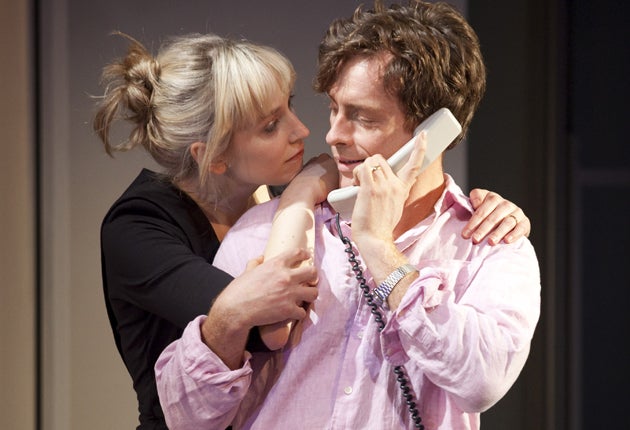The Real Thing, Old Vic, London

Your support helps us to tell the story
From reproductive rights to climate change to Big Tech, The Independent is on the ground when the story is developing. Whether it's investigating the financials of Elon Musk's pro-Trump PAC or producing our latest documentary, 'The A Word', which shines a light on the American women fighting for reproductive rights, we know how important it is to parse out the facts from the messaging.
At such a critical moment in US history, we need reporters on the ground. Your donation allows us to keep sending journalists to speak to both sides of the story.
The Independent is trusted by Americans across the entire political spectrum. And unlike many other quality news outlets, we choose not to lock Americans out of our reporting and analysis with paywalls. We believe quality journalism should be available to everyone, paid for by those who can afford it.
Your support makes all the difference.Owing as much, or as little, to Noël Coward's Private Lives and Harold Pinter's Betrayal, as it does to his own deliciously quirky and provisional temperament, Tom Stoppard's marvellous 1982 comedy is, above all, a play about the theatre; or a play about love in the theatre; or a play about expressing love in the theatre, as opposed to love of the theatre.
This implies a sort of heartless artificiality in the proceedings totally at odds with what happens, although there is an opening scene from one of the hero Henry's own plays, House of Cards, which threatens to expire in a frenzy of mannered wordplay over Basle, Basil, Geneva, franc and Frank.
The pay-off, though, in which the actress, Charlotte, is accused of not going to Amsterdam but ingeniously covering her tracks with a gift of Rembrandt place mats for her mother, is vintage Stoppard.
And the fact that Henry, who's married to Charlotte, is caught out, like Othello, by a stray handkerchief, confirms that a tangled web of deception invariably has dramatic consequences.
The irony of Henry's predicament is that he ends up as a script doctor on a clunking political drama written by his second wife's protégé, the imprisoned Brodie, "a lout of language" who has set fire to the Cenotaph using a wreath for the Unknown Soldier. Not only that: he's then cuckolded by Annie who has a fling with an actor during a Glaswegian production of the Jacobean incest drama 'Tis Pity She's a Whore.
The central roles of Henry and Annie, first taken by Roger Rees and Felicity Kendal (and in New York by Jeremy Irons and Glenn Close), are two of the finest in modern drama, and their occupation here by Toby Stephens and Hattie Morahan is a cause of nothing much short of rejoicing. They sizzle with carnality, and resentment, and deep-dyed affection, giving the lines just the right air and weight for maximum impact without strain.
It's a glorious demonstration of comic acting at its very best, but Anna Mackmin's production doesn't stint in other departments, with a decisive, clean-cut mostly white design by Lez Brotherston, beautiful lighting by Hugh Vanstone and some pungently animated support acting from Fenella Woolgar (a young, sexy Penelope Keith) as Charlotte and Barnaby Kay as the actor Max first married to Annie.
If I wanted to be picky, I'd cite the last 10 minutes as a bit bumpy in mixing up Annie's fling with the Glaswegian actor (nicely done by newcomer Tom Austen) with the custard-pie deflation of Brodie (Jordan Young); did Brodie have an affair with her, too?
But you can't quarrel with a play where the pop-song-loving Henry, tested on his limited opera knowledge, struggles to identify a Verdi and is asked which one: after a moment's thought he tries "Giuseppe", then settles on "Monty". Which opera? Madam Butterfly.
And he also has the great Stoppardian credo speech about trying to write cricket bats sprung like a dance floor, dispatching balls to the boundary with the slightest nudge. In the end, a defence of artistry reigns supreme: having opinions is one thing, says Henry, but how you express them is what matters; it don't mean a thing if they don't have that swing.
To 5 June (0844 871 7628; oldvictheatre.com)
Join our commenting forum
Join thought-provoking conversations, follow other Independent readers and see their replies
Comments